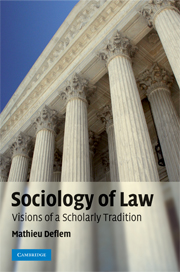Book contents
- Frontmatter
- Contents
- Preface and acknowledgements
- Introduction: sociology, society, law
- Part I Theoretical foundations of the sociology of law
- 1 Law and the rise of the social sciences
- 2 Max Weber on the rationalization of law
- 3 Emile Durkheim on law and social solidarity
- Part II Development and variations of the sociology of law
- Part III Sociological dimensions of law
- Part IV Special problems of law
- Conclusion: Visions of the sociology of law
- Bibliography
- Index
1 - Law and the rise of the social sciences
Published online by Cambridge University Press: 05 June 2012
- Frontmatter
- Contents
- Preface and acknowledgements
- Introduction: sociology, society, law
- Part I Theoretical foundations of the sociology of law
- 1 Law and the rise of the social sciences
- 2 Max Weber on the rationalization of law
- 3 Emile Durkheim on law and social solidarity
- Part II Development and variations of the sociology of law
- Part III Sociological dimensions of law
- Part IV Special problems of law
- Conclusion: Visions of the sociology of law
- Bibliography
- Index
Summary
Thinking about law is as old as law itself, for legal discourse is always a part of law. But even beyond the boundaries of law, it is difficult to make a clear beginning on the discourse on law. Thinking about the social role of law is part of this discourse as well, but not all thought that relates to society is sociological. At the same time, sociology originated from the evolution of philosophy, the humanities, and the move towards the development of other social sciences. It is therefore more than merely a matter of intellectual curiosity to review the intellectual schools of law in the nineteenth century that emanated from the Enlightenment to gradually pave the way for the institutionalization of the various social sciences and the establishment of sociology.
Necessarily selective, this review will in the first instance discuss those pre-sociological thinkers who paid special attention to law in their thought and the not always overlapping category of those whose works have been influential to the development of the modern sociology of law. Among the latter category is most distinctly the social philosophy of Karl Marx, while the former category includes the works of such classical thinkers as Baron de Montesquieu, Cesare Beccaria, Jeremy Bentham, Alexis de Tocqueville, and Henry Maine. Also reviewed in this chapter are the works of early sociologists whose discussions on law have only moderately influenced later developments in the institutionalization of the specialty.
- Type
- Chapter
- Information
- Sociology of LawVisions of a Scholarly Tradition, pp. 17 - 36Publisher: Cambridge University PressPrint publication year: 2008



